#movie: the ox (1991)
Explore tagged Tumblr posts
Text
Dragon Ball Super Movie 1: Broly (2/3)
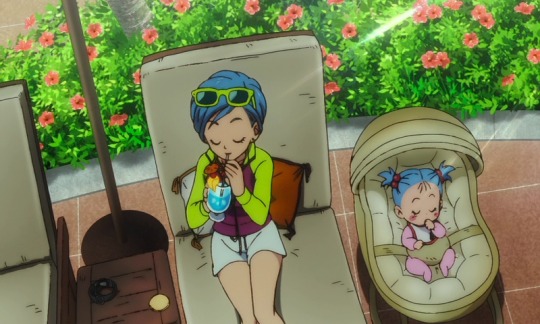
Well, enough of that flashback stuff. Let's move on to the present.
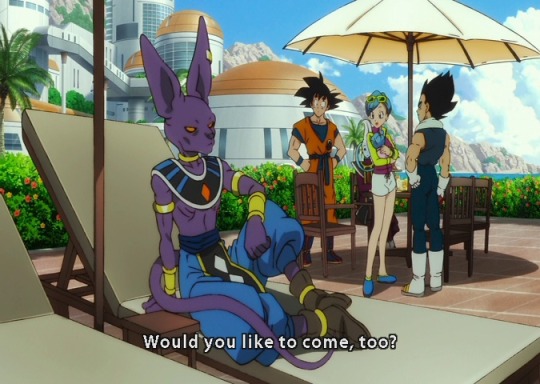
So after the destruction of Planet Vegeta, uh all of Dragon Ball, Dragon Ball Z, and Dragon Ball Super happened. This is kind of a weak point for this movie, because it's story is rooted in Goku's origin tale, but the climax takes place when Goku's a middle-aged man, so a lot of lore has happened in between. There's a similar thing going on when Raditz and Frieza show up in DBZ, and when Broly made his debut in the 1993 film, but Goku was 24-30 in those stories, so it wasn't quite as big a strain.
The thing is, the stuff we had to skip over was extremely important, and the movie simply can't go over all of it. If someone who knew nothing about Dragon Ball watched this thing, they would probably think that this is a story about Goku and Vegeta trying to avenge their people by defeating Frieza, except that already got dealt with in 1991. Goku, Vegeta, and Frieza have each been killed and resurrected... twice. This movie doesn't have time to explain all their baggage, much less how Goku and Vegeta became pals. So no one even tries to fill in the audience on who this big purple cat man is. You either saw Battle of Gods or you just have to roll with it.
And you know what? Good. No one was there to explain Ox King or Mr. Popo to me when I first got into this thing. I've been watching this stuff for a quarter century, and I still don't know what the fuck Tien's third eye is all about. Context is for the weak.
Anyway, this scene takes place on a private island Bulma bought some time ago. She had a resort built here so Goku and Vegeta could spar without damaging West City. And the food is good, so Beerus and Whis tagged along, although neither of them really have any impact on the plot at all. Whis asks Goku why he wants to get stronger, and Goku explains that he's feeling inspired after the recent Tournament of Power arc from the tail end of the DBS anime. Vegeta, on the other hand, is only concerned with Frieza, who was restored to life during that storyline. Frieza's more powerful than ever before, and Vegeta expects him to get even stronger and menace the Earth again.
Sure enough, Bulma gets a call from Trunks as Capsule Corp, who informs them that Bulma's collection of Dragon Balls and the Dragon Radar have been stolen by goons wearing Frieza Force uniforms. But the joke's on them, because Bulma only had six of the Dragon Balls collected. The seventh is on the Ice Continent, so they know exactly where to go to intercept the thieves. Beerus doesn't want to tag along for the trip, so Bulma leaves her infant daughter Bulla with Beerus.
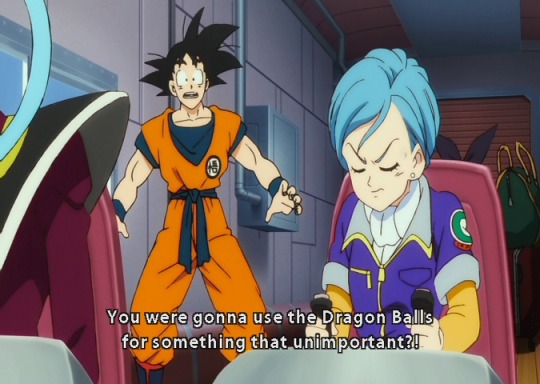
So what was Bulma planning to wish for? She admits that she was going to ask Shenron to make her look five years younger. Why only five? Because if she got too young all at once, people would think she had work done.
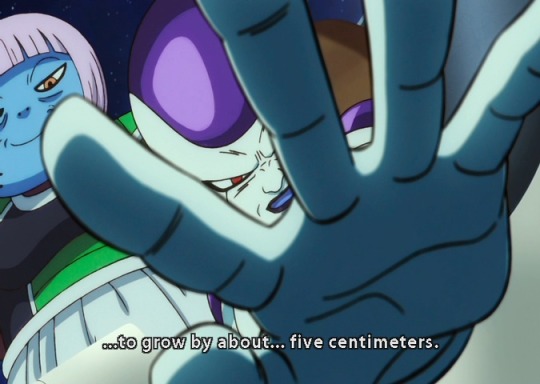
So what does Frieza plan to wish for? Immortality was what he wanted on Namek, but not this time. No he only wants to grow about five centimeters taller. Why not just use his second or third forms to be tall? Because he wants to be taller in any of his forms. Why only five centimeters? Because he wants it to seem like he's still growing.
I've never been too happy about this gag. I mean, it's a good gag, but I liked it better the first time, when Commander Red planned to use the Dragon Balls to make himself taller. It does add some complexity to Frieza's character, though, since he's not just stubbornly trying the exact same routine that got him wrecked on Namek, and then killed on Earth, and then re-killed on Earth again.
This time, he's not trying to take the Dragon Balls by force, because he knows Goku and Vegeta are too powerful to challenge head-on. So he's using stealth instead. The minions he sent to Earth are weaker guys, which mean Goku and Vegeta wouldn't sense their ki. And it seems like Frieza's plan is to just sneak down to Earth, make the wish, and head out before anyone can stop them.
And he's not pursuing the same wish he had twenty-odd years ago. Really, Frieza was never that interested in immortality in the first place. He only decided to wish for that because it was the one thing he didn't already have. But now he's been dead twice over, and that's given him a new perspective on life and death, and he seems to think being unable to die would be similar to the unending torment he experienced in hell. Neither does he seek an invincible body. I'm not sure Shenron could give him greater strength, but Frieza feels that would take all the fun out of "the game". If nothing else, it's interesting to see Frieza consider this at all. Back in the Namek Saga, he never thought about wishing for greater power, because he believed he already was the strongest in the universe. Now that he knows otherwise, he seems fairly content with that.
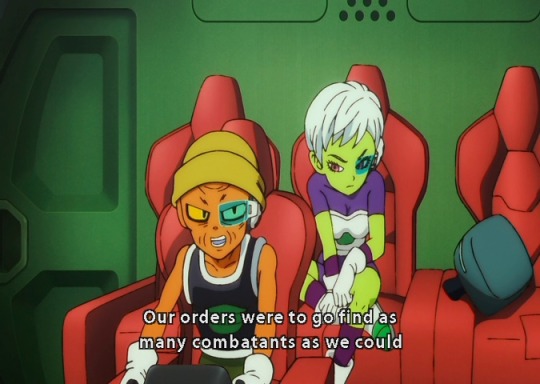
Meanwhile, we meet the last two players in this drama, Leemo and Cheelai. They're operatives in the Frieza Force, but they're not warriors. Leemo's been with the Frieza Force from the beginning, and Cheelai's a recent recruit, having joined up to avoid the consequences of stealing a Galactic Patrol ship. Their orders are to find more warriors to join the Frieza Force, since their ranks are pretty threadbare. Remember, when Frieza destroyed the Saiyans, they made up half of his fighting force. The other half was still quite formidable, but all of his best troops ended up getting killed during Frieza's disastrous invasion of Namek. Then Frieza came back and tried to attach Earth in Resurrection F, and he brought like a thousand soldiers with him, and those guys all got killed as well.
As Cheelai observes, Frieza is down to women and old men like herself and Leemo. There just aren't many warriors available in the universe these days, because all the good talent got killed off a long time ago. As they discuss this, Leemo picks up a distress signal from Planet Vampa. Thinking their might be a reward for it, they head over to answer the call, and find...
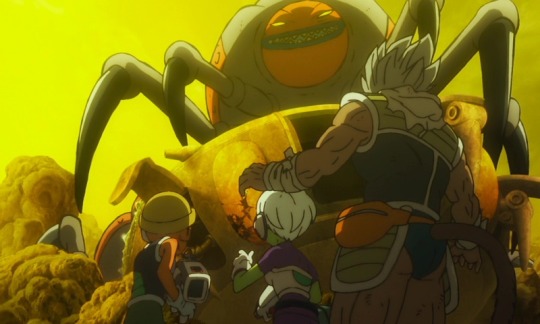
Paragus! Also a bunch of alien monsters. Fortunately, Paragus isn't alone...
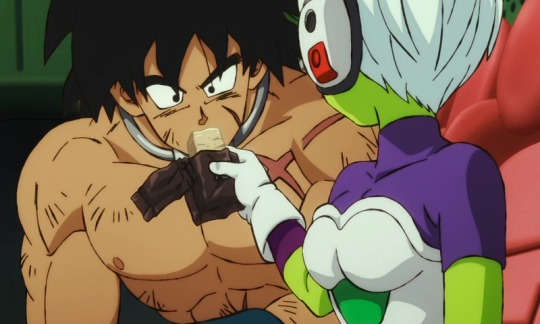
They also find Broly on Vampa, and he's all grown up and stronger than ever. Their scouters measure Paragus' power level at 4200, which isn't too impressive these days, but it's way better than anything the Frieza Force has at the moment. And Broly's power is too high for the scouters to measure, so they definitely want him to come along. On the way to Frieza's ship, Cheelai feeds Broly rations and takes a liking to the big guy.
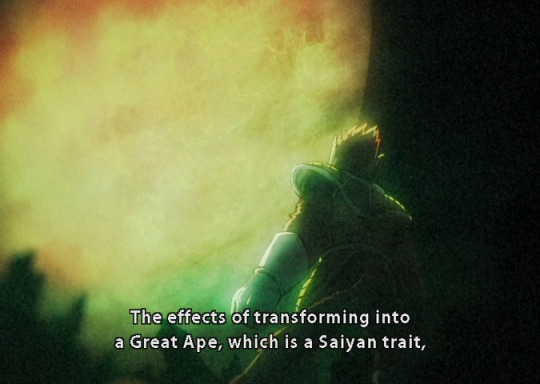
When the four of them report to Frieza, Paragus explains that he had to cut off Broly's tail because of the frequent full moons on Vampa, which cause Broly to lose control of himself as a giant ape. Occasionally, Broly still loses control of himself anyway, but Paragus can rein him in using...
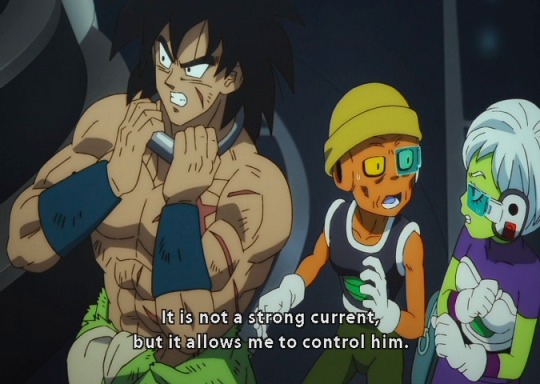
... a shock collar, which he can activate with a remote control. Leemo and Cheelai are horrified to learn of this, but not so horrified that they turn down the generous reward Frieza gives them for their discovery.
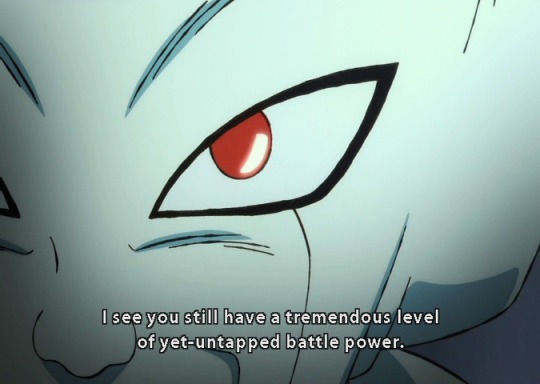
Now, one thing that always bugged me about this movie is that Frieza immediately starts making plans to use Broly against Goku and Vegeta. He wasn't planning to attack them this time around, but now that he has Broly on his team, it seems much more favorable. Later, when the fighting starts, Frieza is disappointed to find that Broly can't transform into a Super Saiyan, but why would he expect Broly to be able to do any of that? Sure he's a Saiyan, but Goku and Vegeta have mastered power levels far, far beyond what other Saiyans have ever dreamed possible.
But I keep forgetting that Frieza can sense ki these days, the same way Goku can. Back in the Namek Saga, Frieza had to rely on scouters like the rest of his goons, but when he trained to become Golden Frieza in Res F, he learned to sense energy. So when he sizes up Broly, he's not just guessing at how strong this guy is. He can actually perceive the untapped potential in Broly's body, and he seems to recognize that Broly would be capable of giving Goku and Vegeta a hard time. So it makes sense.
Anyway, Paragus is happy to cooperate, since he still despises King Vegeta for what happened, and he's down to attack Prince Vegeta to even the score. And Broly has to do whatever Paragus wants or he gets another shock.
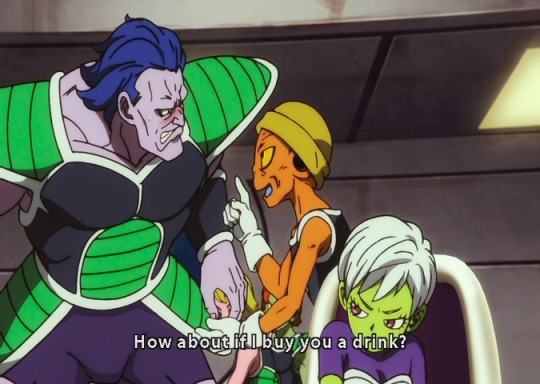
Later, Cheelai tries to get to know Broly better, but Paragus forbids Broly from speaking. While they argue over this, another henchman tries to drunkenly hit on Cheelai. I really like how Leemo tries to defuse the situation here. He's not a fighter, so it suits his character that he'd try to employ a nonviolent solution, like offering to buy this guy a drink. Being a noncombatant in the Frieza Force, he's probably grown accustomed to swimming with the sharks like this. But it doesn't work, and then Broly steps up to use a non-nonviolent solution, which is violence.
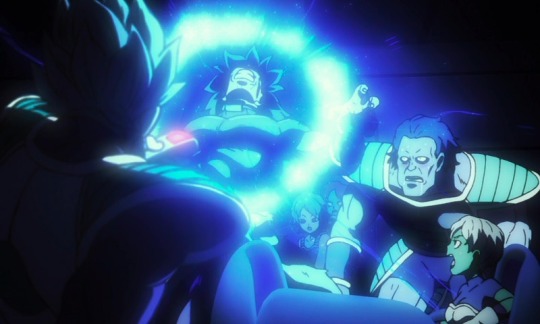
But Paragus doesn't want to offend his host, so he gives Broly another shock. Cheelai confronts him over this, and while she chews him out, she swipes his remote control. Then Paragus gets summoned to talk with Frieza. While he's gone, Cheelai destroys the remote, and they listen to Broly tell the story of his green fur wrap.
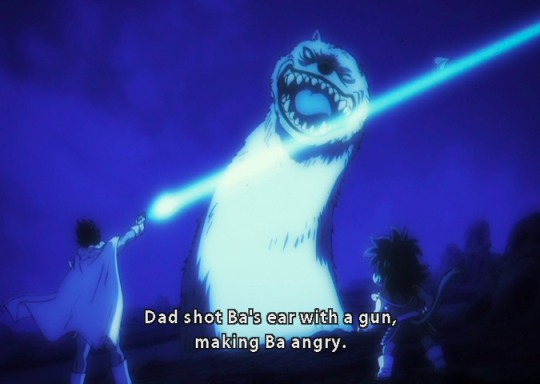
It's a pretty simple story. The closest thing Broly had to a friend on Vampa was one of the large green creatures on the planet. Paragus used the creature to train Broly, goading it to attack, and then having Broly dodge it. But over time, the creature became accustomed to Broly, and they became pals. But Paragus wanted the creature to be hostile, so he shot its ear off with a laser pistol to piss it off. Ever since, Broly has kept the ear and wears it as a memento of their friendship.
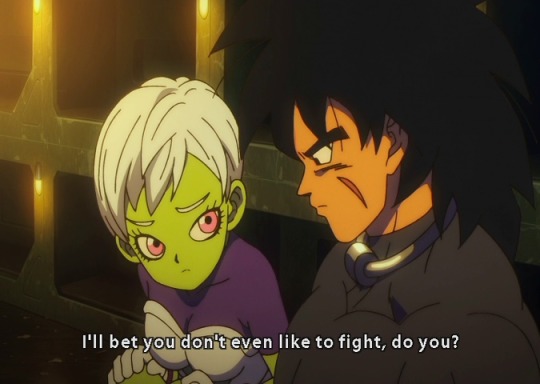
I like how easily Cheelai and Leemo sympathize with Broly in this movie. They're not good guys at all. Cheelai's an opportunistic thief, and Leemo's a cog in Frieza's evil empire. But they're not heartless, and Broly's story is so tragic and innocent that you can't help but feel for the guy. Leemo compares Paragus to his own rotten father, so you can tell that he can relate to what Broly is going through. And Cheelai can tell when someone's being used. Paragus can dress it up all he likes, but he's just using Broly's power to serve his own selfish interests.
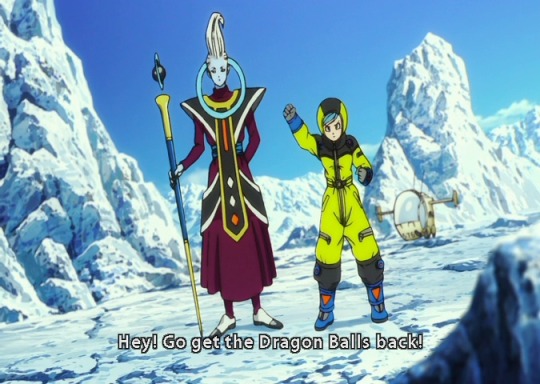
Moving on, Frieza's team on Earth have located the seventh Dragon Ball, and Frieza's fleet moves in to join them for the wish-making. But Bulma, Goku, and Vegeta get their first. They probably would have arrived sooner, but Bulma wanted to stop somewhere to buy cold-weather gear. Let's just take a moment to admire her safety-yellow snowsuit. She looks like a baby duck in this thing and it's great.
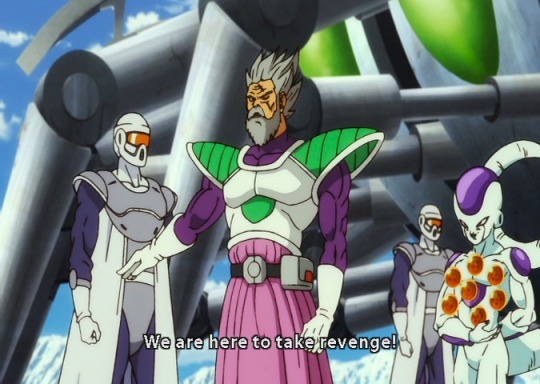
Frieza confronts Goku and Vegeta and introduces Paragus and Broly. I never really noticed these guardsmen who stand by while Frieza steps out of the ship. Paragus should have gotten one of those uniforms, since that pink shower curtain he's wearing looks dumb as hell.
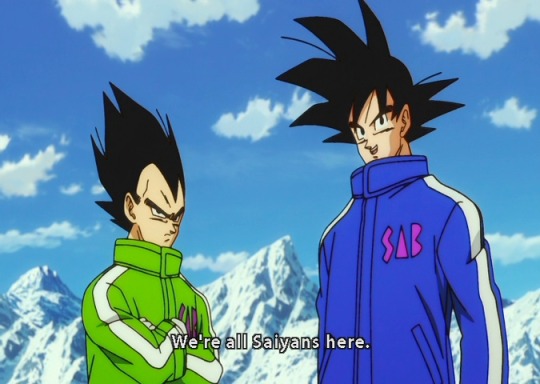
I mean, look at Goku. Bulma got him a sweet blue coat and he looks like a million bucks. He tries to convince Paragus and Broly to get along as fellow Saiyans, but that doesn't get him anywhere. You'd think he'd know better by now.
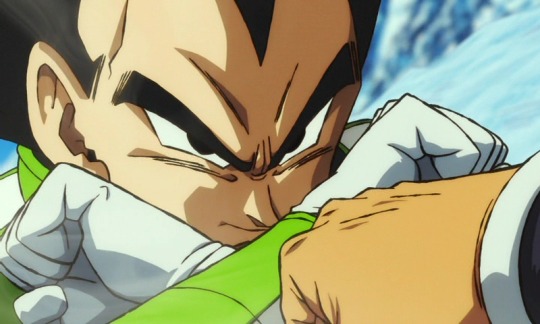
So Broly's rarin' to go, and Frieza sees no reason to make him wait, and it's on. Broly attacks Vegeta, and that brings us to the final leg of this movie, which we'll cover next time.
#dragon ball#2023dbapocryphaliveblog#dragon ball super#dragon ball super: broly#broly#goku#vegeta#frieza#paragus#cheelai#leemo#bulma#whis#beerus#bulla
109 notes
·
View notes
Text
Actually I have a few tidbits on this one-
Recently I went to go see a Disney exhibition at a local museum, where they talked about some of the bts of their most well known movies etc. many of which included some of the original concepts and backgrounds for most of their 2D animated films; here’s what I took from Beauty and the Beast:


In the Disney film (1991) he was drawn out to be a Baboon, an Ox/Bull-like creature and a Gargoyle/Macabre to name a few (which I forgot to take pictures of lol)
But yeah it only further proves the point that 9 times out of ten, the Concept art to most films are often Way More Cooler than the final product (although I can’t exactly say the same for the original concepts of Snow White 0_0 Miss would’ve ended up looking like Betty Boop/one of the Dwarves)
[And for the Captions on the Wall in the second image: the top Left is a Clean Up frame by James Baxter, and the two Concept works on the right are by Glen Keane. Forgot to take a picture of the credits for the Models but thought they looked cool enough to include - they started including them around the time when they were working on The Lion King]
cannot stop thinking about how the beast from Beauty and the Beast was originally envisioned as a baboon. what a world we might have had
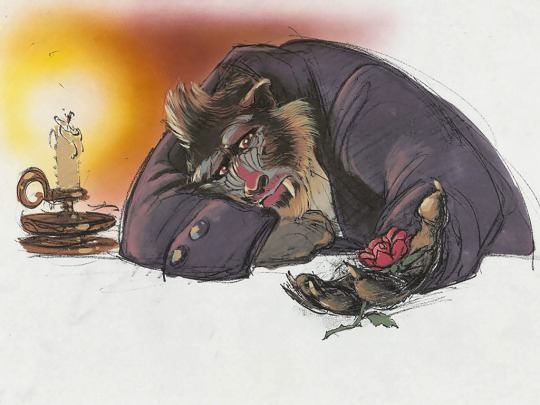
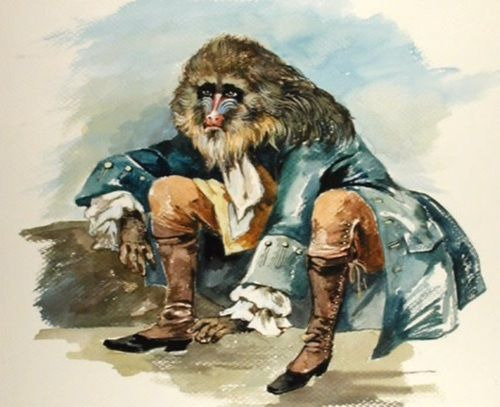
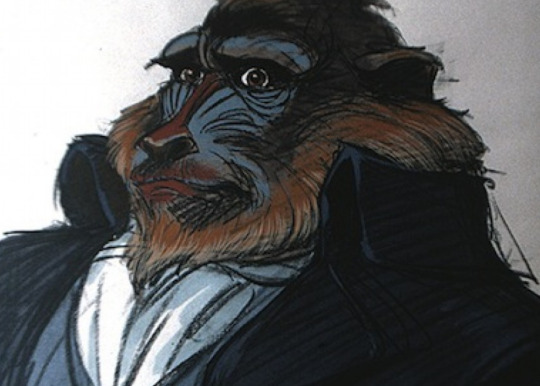
#sorry this kind of got off topic lol#but I do have more pictures of the exhibit/Fun Facts if anyone’s interested#but yeah some of the concepts for like Frozen etc were absolutely Metal#especially the backgrounds#Mulan’s concepts were *chefs kiss*#also they built and entire Model Racetrack out of Candy for Wreckit Ralph#Ralph also originally looked more like an Ape/Gorilla and I feel so cheated knowing that he could’ve looked So Much more Stinky lol
5K notes
·
View notes
Text
Halloween 2023 - Day 4 - Nothing But Trouble (1991)
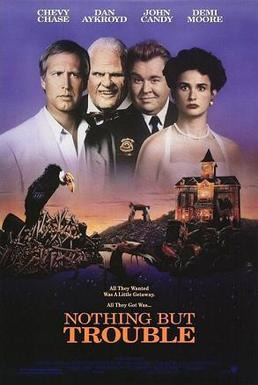
Valkenvaaaaaaaaania!
We take our first trip into the 'horror adjacent' realm today with this horror comedy from the mind of Dan Akroyd. For as much as he is revered for his early work on the likes of SNL, Ghostbusters and The Blues Brothers, Akroyd's later career seemed to go downhill with less favourably received showings and this is probably amongst the low points. It seems like people recognized the potential troubles with is as Akroyd had to write, direct and play multiple parts in the film which can't have been easy and perhaps spread himself a bit too thinly.

The film centers around a bunch of yuppy types, amongst them are Chris Thorne (played by Chevy Chase) and Diane Lightson (played by Demi Moore) who end up taking a wrong turn into a former mining village, Valkenvania, that has been picked clean and all but abandoned except for a handful of old timers who look suspiciously at these interlopers.

Valkenvania is overseen by a strange family, the head of of which Alvin Valkenheiser (played by Akroyd) has appointed himself judge and jury and personally handles even the most minor of infractions that place within the limits of his juristiction. Thorne and friends run a stop sign whilst passing through and chased down by chief of police Dennis Valkenheiser (played by John Candy) who has a tricked out cop car that is able to keep up with Thorne's top of the range BMW.
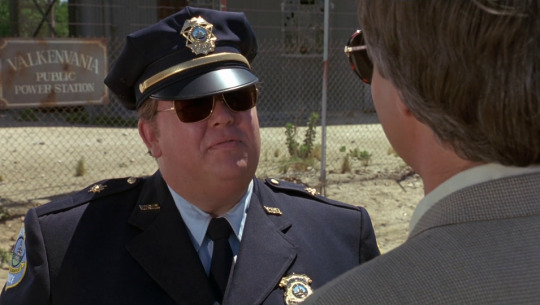
Given the genre of the movie and Thorne being the defacto good guy here, I was really hoping we'd get to see John Candy play against type here. Whatever movie I've seen him in he's just the nicest, sweetest guy so it would have been interesting to see him in a more edgier role as a bit of a bad guy. From the outset though, even though his character is stern, he's also lenient when he overlooks some of the groups infractions as they try to outrun him and tries to get the judge to give them a light sentence. He's even convinced to let two of the group escape later on and abruptly disappears from the movie.

Well, that character does at least, because Candy also drags up to play the role of Eldona, a master mechanic and strong as an ox as she's often seen dragging around criminals by the scruff of their necks. The character is a mute though so, other than through body language, it's a bit harder to get across that menacing aspect since she's little more than the family's muscle.
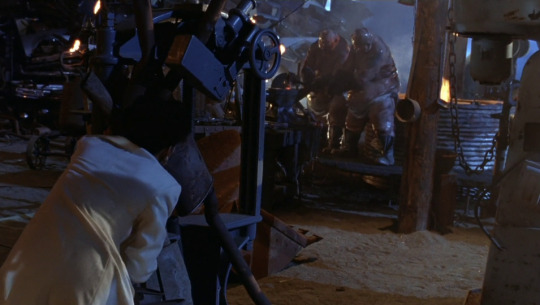
There's also a pair of grotesque twins that are the black sheep of the family, so to speak, being kept at arms length and not allowed within the family house. They're kept outside, smithing through the night like a Dark World version of those dwarven swordsmiths from A Link to the Past. Dan Akyroyd plays one of these two as well so, yeah, a very busy production for him here. It's these kind of characters that really try to sell the horror aspect of the horror comedy, definitely going for that 'fish out of water' thing of someone chancing upon some bizarre, unstable characters like something out of the Rocky Horror Picture Show.

I definitely think the 'horror' aspect is overstated here though, given that the inspiration for the story was a run in Akroyd had after a speeding ticket and being made to spend several hours with the justice of the peace, but rather than just ramp that up by having a group of people trapped within a corrupt town from which they can't escape because of the stranglehold the law has on it, they try to take things in a different direction by making the family into these warped characters. But I'm not sure it really works because, barring the twins, everyone is relatively normal. The judge character is the most exaggerated character with his grotesque facial features but it's undermined by a performance that plays him more for laughs than going for anything menancing or intimidating.

It doesn't really help either that our protagonists aren't the most relatable either so you don't have much sympathy for their plight. Thorne is a bit of a dickbag, which seems to be Chase's go-to role from what I can tell, Lightson is the smartest person there but just repeatedly gets shutdown by Thorne and the other two are these loud, wealthy foreigners that are the aforementioned people that manage to escape so get written out half way through, leaving the unlikable Thorne/Lightson.
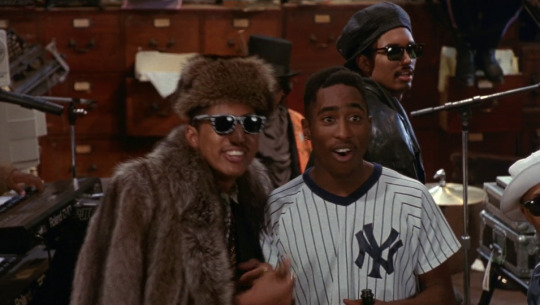
The movie does contain a rather interesting cameo though, as a hip hop group get hauled before the judge and amongst their members is a young Tupac. I can only imagine the movie had left over make up budget and, in addition to the judge's fake nose, Tupac's mate here got one as well. It's a very timely cameo to see given that this isn't the only Tupac matter being brought before a judge right now…
0 notes
Photo






Stellan Skarsgård as Helge Roos in OXEN ('THE OX', 1991) DIR. SVEN NYKVIST
#filmedit#perioddramaedit#periodedit#scandinavian cinema#skarsgardedit#stellan skarsgard#stellan skarsgård#the ox#sven nykvist#*#who: stellan skarsgård#movie: the ox (1991)#ohhh my god i finally found a way to make videos below 720p as crisp as possible#i'm gonna gif the heck out of this movie because he and ewa froling are lovely in it :( so lovely in it
68 notes
·
View notes
Photo




Okay people, I found my second “fav Stellan” EVER. HE’S STUNNING, I CAN’T LOOK AT HIM WITHOUT SQUEALING. (The movie name is “Oxen”/”The Ox”, not the happiest ever made but I’ve watched it yesterday for the first time and for me it’s a little piece of art.)
17 notes
·
View notes
Photo





Oxen / The Ox Sven Nykvist. 1991
Prison Karlsborgs Fästning, 546 30 Karlsborg, Sweden See in map
See in imdb
#sven nykvist#the ox#oxen#stellan skarsgard#prison#sweden#karlsborg#movie#cinema#film#location#google maps#street view#1991
8 notes
·
View notes
Text
I watched the 1991 soviet adaptation of the fellowship of the ring, also known as Khraniteli, which according to wikipedia was broadcast once on tv and then lost for thirty years to only resurface last year. which is a miracle. imagine if I never got to see this clip. (sound on for the experience). so thanks marit for letting me know this exists, if you're reading this!
it's in two parts and it's on youtube here and here.
this is actually a very faithful adaptation of the fellowship of the ring. it includes a bunch of stuff the jackson movies cut out, like the old forest, tom bombadil, and the barrow-wights. In exchange for this, it is the most dull movie I have ever watched. I don't have trouble focusing on movies but I was playing video games while watching this second half because I just couldn't bear it anymore. it was the longest hour of my life. the special effects are so awful I'm convinced that the budget of this movie was $10 and someone's cheap gold ring.
changes (that I actually noticed because I was paying attention at these rare moments) in this adaptation include:
frodo at the prancing pony, instead of having the ring slip onto his finger, danced with a lady and everyone stared at him and he got so embarrassed he put it on deliberately to escape. which is incredible.
we don't actually see gandalf die. which is a shame because I was so looking forward to the balrog. they run out of moria because there are orcs, there's a scene of aragorn pretending he's about to fall off of the bridge, then they run outside and they do a headcount and...... gandalf is gone. he "died defending us". I can't believe they robbed us of what a balrog would look like in this. Or maybe we did see him die and I'd stopped paying attention.
galadriel's temptation by the ring is so weak. like she takes the ring for a little bit, there's a flashforward (?) of her just sitting around and crying while holding it, and then she comes back like. I passed the test! WHERE'S "ALL SHALL LOVE ME AND DESPAIR". THAT'S THE HIGHLIGHT OF THE BOOK. anyways she's a "seer" in this and there's no celeborn.
aragorn has a huge scar across his face and also is I think the only character approaching this with enthusiasm. don't think him being a king comes up at all, but in fairness this is just solely a fellowship adaptation so it doesn't matter much.
I don't believe Legolas or Gimli speak at all. and I think Legolas is played by a woman? Not sure if that was a case of they switched Legolas's gender for #feminism or she just was a better legolas than everyone else. for the... two seconds legolas is on screen.
glorfindel still doesn't show up. he just CANNOT catch a break. has he actually been in any lotr adaptation or is he just too cool for movies.
they make the hobbits look small next to tom bombadil but I guess the technology they used to do that was too much or they realized it looked so bad so they didn't do this with any of the other characters, so it just looks like bombadil and goldberry are giants.
almost forgot. pippin is described as "AS STRONG AS AN OX" in this one and he's bigger than the other hobbits, which is funny. the subtitles keep calling him "pin" too. not sure if that's in the original or a translation thing.
some beautiful examples of the special effects in this:

gandalf's beautiful fireworks
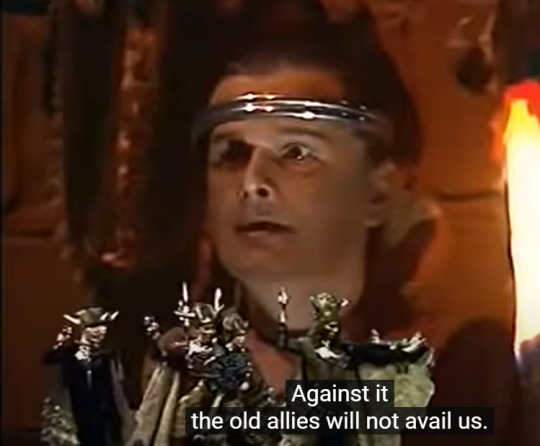
these guys are just dancing underneath saruman while he's speaking. and he looks like this.

excuse the youtube bar but man this whole scene was very incredible
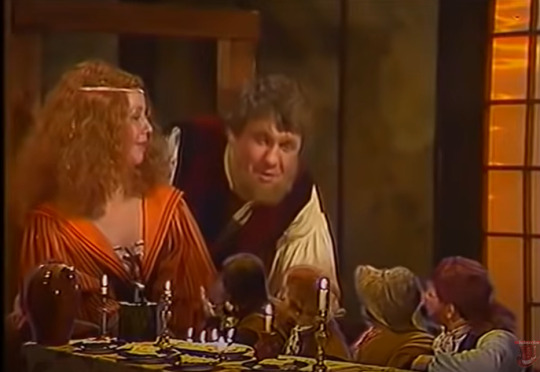
just look at how tiny they are!!
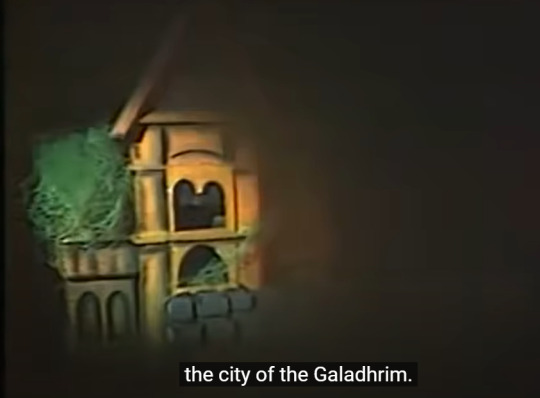
THIS IS CARAS GALADHON GUYS. DEFINITELY NOT SOMEONE'S OLD DOLLHOUSE.
there's more but I actually don't want to go back and rewatch any of this. it was that boring.
I was going to put this on the list I have of the other adaptations but I genuinely can't figure out how to rank it, because it was pretty faithful to the book in terms of the sequence of events, arguably even more so than the jackson films, but it was so incredibly boring and poorly made that I couldn't bear to even put it above the shadow of mordor video games, because at least those entertained me? so I'll leave it out for now. I'll decide what to deal with it later when the wounds are not so fresh in my heart.
29 notes
·
View notes
Text
Claire Denis’ ’35 Shots of Rum’ “I feel like…I have wings…”
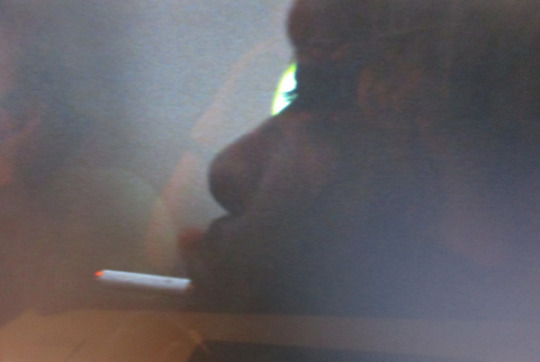
© 2019 by James Clark
These days, an old black and white film about God will find few takers. However, there is a still-practicing filmmaker, namely, Claire Denis, who pulls out all the stops to revisit such a vehicle. Is she a nun? Nope. Is she a God-fearing militant in favor of aid to the distressed? Nope. Is she a social scientist, tracking religious consequences through the ages? No, no, no. What Denis’ excitement pertains to, is the work of that mostly shunned movie, called, The Seventh Seal (1957), created by notable-no-longer filmmaker, Ingmar Bergman (1918-2007), whose output engages the intrinsic disaster of piety and smarts. (The word, “intrinsic,” is crucial here. And as such, her perspective is problematic, not formulaic.) In addition to piety and smarts, that film spotlights a young couple of itinerant circus performers in the 12th century, the husband, Jof, agog with the possibility that their baby boy could become a dazzling acrobat, or a juggler, pulling off an “impossible” trick, the kind of trick only an oracle would imagine.
Intrinsic in the travelling folks’ itinerary, is the sentence of being left out of the lives who, if not making the world go round, making the world theirs. 35 Shots of Rum (2008) contemplates the hopes of Jof, almost a millennium shot forward. As such, our film today carries the special bonus of catching up to, once again, the bittersweet world of Jacques Demy and the musical muse of Demy’s soulmate, Michel Legrand (setting out the latter master’s magical transcendence by way of those deft swallows, the Tindersticks).
Diminutive Jof comes a cropper with the salt of the earth in a medieval beer hall, and, by way of putting a less embarrassing story in the mix, he tells a gathering at his caravan that he “roared like a lion” against the mob. Our protagonist today, Lionel, a Paris commuter train driver (far from Jof’s open road), is an African immigrant-widower who dotes on his adult daughter, Josephine, still living with him. The action here is pensive in a puzzling way. Whereas Jof and Marie are on the hook to circumvent various substantial evils (the plague, for instance), Lionel and Jo seem to lead a rather uneventful, mundane existence. Their reticence to speak (a less extreme strategy of the vow to silence, in Bergman’s, Persona [1966]), counting upon face and body language, becomes a form of poetry you could study for years.
Such a peculiar, elusive narrative presents a daunting task of identifying and structuring the artistry being given to us. One readily manageable gift, however, in this connection, is the opening scene and its riches of rail lines and bustle and a high-pitched, low-textured accordion motif, keening for something misplaced and yet with an abundance of lift, rather like the music of a carousel. The first visual incident involves a set of shining rail tracks plunging forward from the driver’s smudged window. Soon we’re presented with multiplicity of tracks near a railroad station, resolving to one line describing a gentle curve as against the standard fast forward, a departure redolent of both poetry and prose. Even more palpable, however, is the jumble of wiring (a sort of Black Forest or snowstorm) and its masts maintaining electrical power and its dynamics, along with mechanical devices being a force of stasis. Constituting a form of synthesis with those visuals, there is the musical motif, filling out the progressions in such a way that we are transformed as part of the doing of a sorcerer’s apprentice. That formidable protagonist, Lionel, comes into view in close-up profile at twilight with his shift nearly over. Lighting a cigarette and gazing at a more substantial and impressive long-distance train passing by, the set of his face is far from easy. Tindersticks add a flute component, lightening the load somewhat. We see the back of the last coach, touching the black void with two sharp red stoplights near the wheels, and a more diffuse green field of action near the structure’s top. An elicitation to accentuate the positive.

Then we see Josephine (the play of her two forms of name being a bit like the red/ green just mentioned) patient in a Metro car squashed like livestock. She stops at a kitchen store to consider a presser cooker/ rice preparer; and, presto, Lionel comes home to the flat with one, scarlet and shiny, making a statement. What with her doing the laundry and his carefully undressing and having a shower before dinner from that new appliance—she smiling on hearing him come in, and he pleased to be the bearer of good tidings—all the connection involves their silence within a sanctuary of their own perceptual making. This low-key activity allows us to salute the savvy with which they have designed their little nest—choosing paneling in very effective blacks and greys, with subtle yellow floor tiles, and with uncluttered spaces. When they’re close enough for a welcome little kiss, she tells him, “You smell of cigarettes,” a case of maintaining a pristine society. (Another of the audacious compositional touches is the virtual disappearance of Caucasians in the City of Light—Josephine’s subway, for instance, entirely filled with blacks—as if this enclave represents the best hope of clear thinking.) Seated quietly, they eat with gusto. She puts on some lively music—far less lively than what we heard along the tracks—and Lionel picks up two apples for their continued health. Sanguine, for sure; but not successfully addressing those minutes, probably frequent, in the dark engine.
Upping the ante, the only black in sight not serene, namely, Rene, an old friend of Lionel, has come to his retirement day at the commuter system. Lionel watches the man of the hour about to clean out his locker, and he is apprehensive that his friend has dangerously lost the company grip. (At his suicide, our protagonist being confronted with the horror of Rene having chosen a place on the rails where the calm one would encounter him, the latter holds a difficult silence, culminating in, “Fuck, Rene!” [you’ve overreached].) Certainly, our careful one, would never place on his locker wall a photo of a pretty sharp acrobat, spinning many plates by way of a multiplicity of long sticks. To ponder such sensuous acuity is to be on the hook to see and feel things in a very different light. Lionel, on that special, presumably happy day, comes upon that aficionado as he trembles. And being a rock of some endurance, urges, “You can’t fall apart now. Not in front of everyone…” On to the retirement party, and Rene can’t manage a smile. From the girls, there is a beautifully designed, rather rakish, leather jacket. From the “brothers,” a scepter (ravishing in its mosaic details), the likes of which a jungle king would have close-by when presiding. Still glum, Rene manages a brief speech: “My friends, thank you for being here. I’ve waited so long for this. It’s a deliverance, you know. [His troubled manner has all of them on edge.] Tonight I feel like… I have wings…” On the Metro, with Lionel, his scepter wildly incongruous, he tells his friend, “Surrendering… Surrendering to this condition, is what’s so hard. I’d liked to have died young. But I’m at the age I’m at. And healthy as an ox. I’ll die at 100 at this rate… I don’t have this life in me. The subway and all that. It hit me unarmed and unprepared…” A few days later, they meet coincidentally in a bar. Lionel asks, “Got any plans?”/ “Tons,” Rene ironically replies. (Another gift, during the festivities where the lucky man spends most of the time with head bowed, is an iPod. Someone tells him, “All your music at your fingertips!” Music, again, but bulk; and Rene, the acrobat manqué, feels the pain without a plan to beat it. Lionel had for years been staging special events, dear to his heart, in the form of a drinking binge of 35 shots of rum in quick succession—his sense, for what it’s worth, of regal acrobatics. “Down the hatch,” a woman in the company [all black, of course] is cheered on. She ends her run at 16. The natural follow-up would be for Lionel to run a row of slam-dunks. But, to the surprise of all, he says, “Not tonight…” The vision of Rene’s horror has induced that current of self-criticism in our protagonist, rarely elicited; and soon it’s back to the tune of, “Fuck, Rene!” Oodles of charm, a go-to friend, to many. But.)
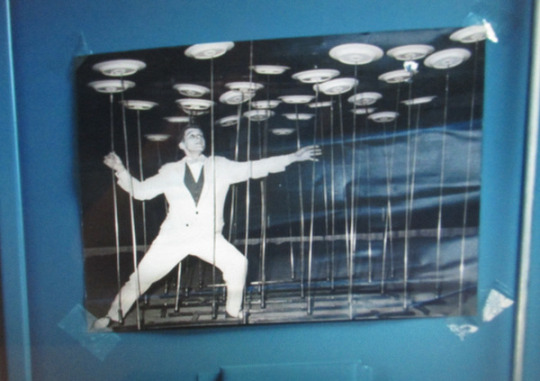
Jo, within the aura of Marie (a 12th century pragmatist), is enrolled in a college program of Economics, where she can practice utopian possibilities. The first sustained action in the world at large where we see her is to go jogging with a young mulatto man, Noe, who occupies the penthouse of their building; and joins Rene in distraction—not due to lack of understanding but lack of devouring. (That would introduce, though, the third member of Jof’s troupe, namely, Scat, who sleeps in a hammock near the ceiling of their caravan, and sleeps with as many women as he can.) They’re in cool apparel as they cruise along the industrial service road where their building stands. She begins to outpace him, and, true to form, he jumps into the Seine (far from the Seine of tourists and billionaires). “You’re crazy!” she laughs, when he regains the service road and the upper hand. (The little acrobatic, of the jog which suits her, being eclipsed by jagged face-saving and latent hostility.)
While Josephine wends her way to oblivion, there is a woman, Gabrielle, the unofficial manager of the easily managed centre, who shows to us, if not the virtues of wide variety of mood, their capacity to put into play juggling initiatives, come what may. One thing she does have up her sleeve, however operative, is the tangled history of films about taxi drivers (she being one), particularly, Jim Jarmusch’s film, Night on Earth (1991) and Abbas Kiarostami’s Ten (2002). She begins her tenure on the pavement with the complaint, “This is not my day…” A young dude, needing to move only a few blocks, counsels her to practice “flexibility;” but, in fact she’s already on the case. She maintains that she knows very well how fortunate she is, in finding every day to be unique. And, “No boss breathing down my neck.” In addition to her being a queen of the road, she’s frequently sitting in the dark, on her balcony or even in the stairwells of her home. Jo, rather obtuse for a closet mystic, teases her that she’s still carrying a torch for Lionel, who lived with her for some time before and after Jo’s German mother died, necessitating the young girl to come to Paris and her bemusing father. Despite the misalliance, all the players in this relationship have generally found ways to pleasurably intermingle. But the ways of volatile Gabrielle are not the ways of muted Lionel and Josephine. She also visits that bar where Rene needs the alcohol, and gives him a sunny smile (during the interregnum of Lionel’s patriarchy Rene would have been a frequent guest). After a quick espresso, she’s out the door to get back to work. And from the suicidal one’s perspective, and its remarkably dirty windows, she’s been transformed from incandescence to a blizzard of grey deadness. Such a fate dogs her to the end, a veritable sentence of solitary confinement. But it is her resilience, notwithstanding (like the taxi/Mom in Ten), which matters. (A “Fuck, Rene!” [and all the other cripples]; but in being disappointed for him and the rest, not pissed off that a lame clique had been abandoned.) She undertakes posting a thankless note about the by-law there, about someone leaving a bike in the hall. (Noe trips over it in a dark passage; and all he does is yell, “Shit!”) More thankless care comprises how often she invites Josephine to her suite and is given excuses that her studies come first. The four of them are excited to have tickets for a popular band. Off they go in Gabrielle’s car in a rainstorm—she, knowing Lionel only too well, asks, “Got your wallet?”—and the car breaks down (Gabrielle, as so often, no doubt, succumbs to, “I can’t believe this!) due to transmission problems. The concert never happens for them, how could it? But they’re within walking distance to a Jamaican restaurant they know, insisting, “We didn’t feel like going home like this.” (Remarkably, though, the place had already closed; but, in the current of the fantasy easiness here, the woman-proprietor welcomes them, and happily prepares suppers on her own. On the other hand, that generosity and sanguinity is something else.) The sound system comes to life, and Lionel and Gabrielle enjoy dancing together. Jo smiles at this, and soon she and Noe are the night’s special event, the passion of their embrace becoming a concern for her dad and a reflection for Gabrielle. The food arrives, and the host’s black and white dress is like a bit of outer space, a bit of a silent concert. Noe, while dancing with Jo, exclaims, “You’re something else!” He got the wrong girl. (During the inevitable wedding, Jo tells Gabrielle, “You’re not going to cry?” When the latter tries to help with the bride’s outfit, Lionel tells her, “Jo can do it herself.” We last see her sitting alone in a shadowy stairwell.)
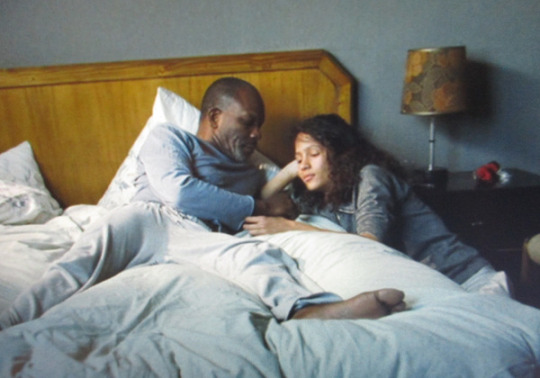
The sequel of that calypso meal finds three of the four at Noe’s apartment. His cat has died, and he disposes of it with not a moment of care. Dumping the body into a garbage bag, he brags, “No frills, he’s dead and gone for.” This finds Josephine covering her nose and mouth, and saying nothing. Gabrielle’s asking for an aspirin at least reflects being distraught. (Here the axiom, stemming from Jarmusch, of abusing a pet, means the abuser has metaphorically become roadkill.) With this he announces his interest in moving to Gabon (“pays well”); and Jo goes through the motions of dissolving what was supposed to be elevated performance. Wouldn’t you know he’d couch his departure with, “Now that my cat’s dead, I’ll like it” [the offer]—more fake acrobatics. But this shake-up involves depths and shallows, to savor, racing back to the lyrical and ambiguous curve of the tracks in the first scene.
Jo protests, “You’ll ditch us and go away?”/ “Why not?” the TV poker gamer bluffs. “You always tell me how it’s ugly and old here” [a list of her surprising immaturity including being unmindful of the historical and advanced possibilities of Paris]. In this context, a cut to Lionel, who for various reasons might have preferred sleeping to remaining in that company, finds him walking along a sidewalk eating a croissant—to him a non-ugly factor. On arriving home, he finds Jo in a frenzy to clean their flat. (While still on the sidewalk he notices her putting finishing touches to cleaning Noe’s balcony window—forcing her to stretch in a precarious way. [Acrobatic, sort of.]) Lionel’s confusion about the cleaning blitz extending to his place displaces his placing out more croissants, and messes up his reading the newspaper designed for flat-earth fanatics. “Why are you doing housework?” the sort of poet asks. “Isn’t it clean enough?” When Noe yelled, “Shit!” was he in error? Does Gabrielle’s client/stranger’s demand for “flexibility” start biting here? Jo moves on to rifling through old photos, including one showing her German mother and Josephine as a baby, and proposes throwing all of them out. Lionel is far from happy about this frenzy, so foreign to his learning. She counters that, “It’s filthy here! We need to empty it all out.” Her recruitment by Noe has no heart for a mosaic on the wall, traces of her father’s rather pathetic poetry. In the confusion he calls out, “This makes no sense! Think of yourself.” To which she counters, “Noe’s leaving!… I’m leaving, too” [the clean-up in the service of giving her father a clean home to be alone with]. “Don’t be silly. We’ll do as we please. As we always have. Nothing will change…” is the desperate hope. Jo yells to him, “Yes! Everything will!” Finding among those keepsakes a letter written by her mother to Lionel living in Paris and living with Gabrielle, we are taken up by a facsimile of one of those enthralling dramatic dialogues which Bergman had become a master in delivering, to deepen our understanding of the principal’s dilemma. “Lionel, I miss you. I miss you so much. Josephine finally fell asleep. She looks like you when she sleeps. It makes me love her even more. Please let me live by your side every day. She’ll be my daughter, too. My love, my rascal…” On the heels of that discovery, Josephine knocks on Noe’s door. When he opens it, she finds his arrogance: “You have something to tell me?”
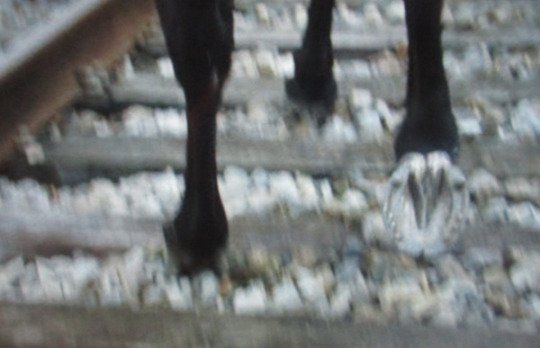
Coinciding with that Road to Gabon, Lionel, “the rascal,” has lost Rene, but in the course of a rhapsody/daydream on the job, he conjures a horse and a wagon on the tracks as far back as the heights of Jof and Marie. Somehow the image of Jo also appears, for a fraction of a second—this being an apparition for the ages, regardless of stiffs like Noe. And thereby they take off the tarp from their long-dormant Volkswagen van in the underground of the facility (close to where Gabrielle parks, with the little touch of pedantry masking her roof-light to offset rascals), to play one last (confused) victory lap, to Germany (where Jo learned to speak German before reaching Paris after her mother’s early demise). In a cast generally mustering understated performance from blacks and their secret hideaway to transcend a terminally polluted mainstream presumptuously claiming to be viable, the home stretch unveils an elderly German lady (Jo’s grandmother), who takes over—a bit of a scandal in an era of race obsession—as a Bergman oracle, typically smothered by a roster of fakes. “We don’t see you enough. That’s the way it is now. We all live such withdrawn lives [Jo, if only she were alert enough to grasp the outrage being alluded to]. Everyone in his corner. Every man for himself. Would you like some coffee?” (Jo’s capitulation coming across subliminally, as in, “Yes, I would Ma’am.” The hostess retorts, “You don’t have to be so formal” [largely mundane, Jo, having succumbed to formulaic piety and smarts]. You must have been driving all night [as with Jof and Marie, on that long night when “formal” Death commanded nearly everything in sight]. You can stay for lunch, or even spend the night.” Jo replies, in German, “Thanks, but we want to get back on the road [brave words, but here the usual subterfuge; and masking, I’ve got a wedding to bring off, with a fake acrobat]. Maybe some other time” [when hell freezes over]. Does this obtuse connectivity derive from Denis’ background in Africa?) The old gal, disappointed with her prim relative, subtly mocks, “Some other time…” She swings past this transmission problem, however, by recalling a (very) brief joy. “Your mother said she fell in love with a guy in Paris. I asked her, ‘Is he cute?’ [oracles not likely to pose such questions in a straightforward way]. She looked me straight in the eyes and said, ‘You’re going to like him’” [the speaker has a troubled face and she looks downward]. Rallying once again, in face of this semi-invasion, or Death, she finds something lively. “I taught her to swim. She was scared of the water. We’re all scared of it. I’m also scared of that [nearby, North] Sea. So vast, so wide. And when you scream, no one hears you… Lionel, do you remember that time when we all went swimming together? We basked in the sun. Lost in the dunes [ring a bell?]… Good wine [she smiles]. Not always that good” [when Lionel was buying; the volatility raining down, and needing to be met]. Though he would not follow the verbal language, there was, in the body language of this transaction a delivery of that day. A delivery the steady and gentle “cute” “rascal” chooses to ignore. “You don’t remember?” she asks him. Her hurt, from this lie, is short lived. “Why don’t we drink some wine? A little glass of wine, now. Why not?” (There is a cut to a wall in that room, showing Jo as a baby held in her mother’s arms; and a dark print of a nude woman seen from behind, treading into the sea at night with a moon casting moonlight on the sea. Iconic matter, to someone, anyway.) “A little glass,” she perseveres. Then they are all drinking that wine. Lionel silent, in a dilemma, unsheltered by his usual comrades. The oracle has more to say. “Sometimes it seems the whole world is scared of suffering. Everyone wants either total stress or some peace in their happy little lives. But not us, not us! We’re strong, aren’t we? Aren’t we Lionel?” The latter minor poet, gracing so many rigors, comes up empty here, very well understanding that he is hated. “I’m glad Josephine gets by in German. It makes me happy” [dipping into the “happy little, prosaic lives” so potent in Bergman’s Fanny and Alexander]. “Just like your dad” [to be a stiff], the lady, clearly fluent in French, skewers a surprising target.
After a short stop to the grave, pouring some water on the flowers, while golden leaves waft down in lieu of almost total neglect, the van reaches the shore, recalling the embarkation of buttoned-down Block and his squire (the aristocrat who fails, and the salt of the earth, who also fails), coming ashore from a crusade centuries ago. It’s All Saints Night, and a group of children, carrying lights and singing, goes by their caravan, etched vividly in the twilight as they negotiate a ridge. Peering out of their home away from home, they fail to pierce the urgency of that full-hearted dash for the sake of a lively life, so long ago and remaining to be fulfilled.
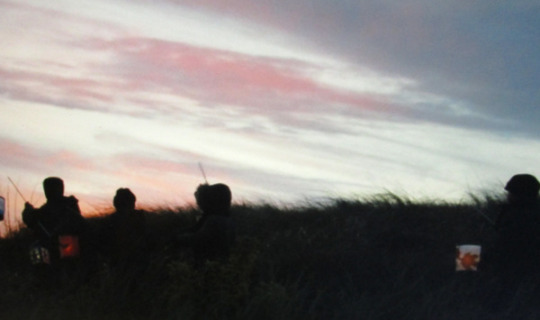
How dare, then, Lionel’s wedding gift of a rice-cooker (“Living Tech” brand), snow-white with a few sissy images at the base—as if to look down upon Jo’s retreat? The slight fails to register with Jo, but it had better register with us. There are many enclaves on this planet sworn to never hear a discouraging word; and some—like that of the club we’ve just taken the depths of—actually being overachievers. But thanks to that oracle, our love affair of the sweet (musical) suite and the sweet apprehensions (as in the small handful of great Demy films) must unequivocally demand more. As the wedding reception rolls on, with a pianist a bit less sweet and a bit more bitter, Lionel climbs the rum shots game, to perhaps reach something to quieten his malaise. “A moment like this only happens once,” he overstates. Neither a consummate acrobat with his rum, nor a consummate juggler with cronies, Lionel—harkening to that siren call having endowed those falling short in Demy films remaining lovable (and a lovable longshot for reaching the strictures Jof had in mind a thousand years ago)—settles in to enjoy the party. But his miasma (far more potent than the ton of rum he’s feeling as we leave him while never forgetting him) is the real concern of this masterful film.
As if a divided homage to this rather secret society—and especially the secret society that was Lionel and Josephine—Denis has planted several factors in her film which amount to a possible blossoming of a long-overdue being “strong,” and not being “scared of suffering.” Some we have already encountered—for instance, Lionel and Jo on a long-ago horse, implying proof against the fear of the likes of Rene. And yet a mark of shame, due to that shining, though flawed, accomplishment of Rene, so more honest. This touches upon the pedantry of Josephine, in action during her college preparations, to become what many others insist she settle for. She mouths, like so many others before her, that “the Global South has not been handed the credits to thrive. “It is neither right nor wrong. Rules, used to manage international debt-loads, impose trouble upon countries in debt. I don’t think we can ignore (Joseph) Stiglitz” [American Nobel Prize winner, in the field of “Economic Sciences”]. (The Prof notes, “You say it as if it’s totally self-evident. It’s a little pedantic…” [pedantry eliciting fear, as in Wild Strawberries]. Another student—coinciding with flawed but somewhat cogent, Rene—argues, “When we revolt, it’s not for a particular culture. We revolt simply because, for many sources, we can no longer breathe…” More bookishness surfaces during Rene’s finally returning a book he borrowed from Lionel. The latter admits that he had forgotten all about it. The subject was about the evils of being “educated to death,” which, it transpires, had become a joke amidst the cognoscenti. The title was Mars [War]. We can well understand why he, so scared of suffering, forgot about it. But that he touched it at all, is a revelation!) On Noe’s wall is a poster, titled, ODISSEA 2001. Flashy optics. No Mars. Their marriage won’t last a year. Then, what?
Many viewers, with a didactic bent, have inferred that 35 Shots of Rum is patterned on the Yasujiro Ozu classic, Late Spring (1949). They claim to have strong evidence by way of the Denis documentary, Talking with Ozu (1993). A few narrative steps do coincide; and the rather precious disinterestedness of the Japanese protagonist does (vaguely) show that area of musicality here. Could the contrasts between the films be urgent here—Denis’ film being modern cool, while Romantic Ozu fumes about the cruel frozenness of Japanese action? Another aspect of Talking with Ozu, is her warning that she “dislikes auteurism and the cult of cinephilia.” The pros read this, and proceed nevertheless—a move like stepping off the observation deck of the Empire State Building. The bona fide involvements here, with Bergman and Demy/Legrand, have very little to do with the movie industry, as it has chosen to fool with.
0 notes
Photo










MESAK aka TATU METSÄTÄHTI
[ Mr. Velcro Fastener | DUM | Tie Entertainment | i220 | Laton | Harmönia | Klakson Records | Dolly | Dolly Deluxe | Berceuse Heroique | Monkeytown Records, Helsinki / FIN ]
Brief bio of an artist: Mesak hails from the ground zero of modern Finnish electronic music, both mentally and geographically. He is a key figure in the 90´s electro scene in Finland, Styles and names are bountiful and plenteous. His electro bangers by Mr Velcro Fastener always have been cult for those tastemakers in the scene and with his Mesak moniker he is an integral contributor and artist within the label catalouge of the Dutch Electro and Techno label Klakson run by Dexter and Berghain resident Steffi. Keep on reading more ...
without the past … there’s no phuture … these alltime top20 faves in no particular order
01 THE ORB [JIMMY CAUTEY/THE KLF & ALEX PATERSON]: Aubrey Mixes: The Ultraworld Excursions [ Big Life BLR-LP14 UK LP/Album | 1991 ] 02 AUTECHRE [ROB BROWN & SEAN BOOTH]: Elseq 1-5 [ Warp Records – WARP512 UK wave.file Album | 2016 ] 03 SCIENTIST [HOPETON OVERTON BROWN]: Scientist Rids The World Of The Evil Curse Of The Vampires [ Greensleeves Records GREL-25 UK LP/Album| 1981 ] 04 ICE CUBE [O'SHEA JACKSON]: AmeriKKKa's Most Wanted [ Priority Records SL57120 US LP/Album | 1990 ] 05 KEITH FULLERTON WHITMAN: Disingenuity B/W Disingenuousness [ Pan PAN-13. LP GER 12"/Album | 2010 ] 06 AUTECHRE: Incunabula [ Warp Records WARP-LP17 UK 2x12"/Album | 1993 ] 07 UR: Electronic Warfare - Designs For Sonic Revolutions [ Underground Resistance UR-033 / Submerge US 2x12" | 1995 ] 08 CANNIBAL OX [SHAMAR GARDNER & THEODORE ARRINGTON]: The Cold Vein [ Def Jux DJX07-1 US 2x12"/Album | 2001 ] 09 ROSS 154 [JOCHEM PETERI]: Fragments [ Eevo Lute Muzique EEVO-006 NL 12" | 1993 ] 10 TSEMBLA [MARJA AHTI]: Terror & Healing [ New Images NI-23 US LP/Album | 2015 ] 11 BACHIR ATTAR with ELLIOTT SHARP: In New York [ Enemy Records EMY-114 LP/Album | 1990 ] 12 MUSLIMGAUZE [BRYN JONES]: Uzi Mahmood 1-13 [ From “Uzi Mahmood” Soleilmoon Recordings SOL-161 US 2x12" | 20++ ] 13 SM/DP [MARKO SUORSA & PENTTI DASSUM]: Fault-Tolerant System [ Nekorekords NEKO-32 FIN CD/Album | 2017 ] 14 LILJOR [HENRIK VON EULER]: Skymningsstund [ Flora & Fauna FFLP-22 SWE LP/Album | 2016 ] 15 Ø & PANASONIC [MIKA TAPIO VAINIO, ILPO VÄISÄNEN, SAMI SALO]: Sähkö The Movie Soundtrack EP [ Sähkö Recordings Sähko-029 FIN 12" | 2018 ] 16 MONO JUNK [KIMMO RAPATTI]: With You [ B1-track from “FP-004” Forbidden Planet FP-004 US 12" | 2014 ] 17 MOUSE ON MARS [ANDI TOMA, BLACK MANUAL, DODO NKISHI, JAN St. WERNER]: Niun Niggung [ Thrill Jockey thrill-076 US 2x12" | 1999 ] 18 AUX 88 [KEITH TUCKER, TOMMY HAMILTON, WILLIAM SMITH]: Bass Magnetic [ 430 West 4W-190 US 2x12" | 1994 ] 19 WAQWAQ KINGDOM [ANDREA BELFI, KIKI HITOMI, SHIGERU ISHIHARA]: Shinsekai [ Jahtari PCD-17765/ P-Vine Records PCD-17765 GER/JAP CD/Album | 2017 ]
#tomlinder bookmarks: FACEBOOK | BIOGRAPHY | DISCOGS | INSTAGRAM | RA SOUNDCLOUD | MR VELCRO FASTENER | YOUTUBE BOILER ROOM | SYSTEM 108 PODCAST | BOOKING
#mesak#electro#electrofunk#helsinki#finlandia#mrvelcrofastener#DUM#tieentertainment#i220#klaksonrecords#dollydeluxe#berceuseheroique
0 notes
Photo



Animage (07/1991) - Fushigi no Umi no Nadia - illustrations by Noritaka Suzuki (Studio OX) for the novel “Nadia 17-sai e no Prologue”, a prequel to the movie.
150 notes
·
View notes
Photo

QUOTE
"You must take personal responsibility. You cannot change the circumstances, the seasons, or the wind, but you can change yourself.” -Jim Rohn
BASIC
NAME: James Elijah Perroneau NICKNAMES: J AGE: 45 BIRTHDAY: May 19, 1973 GENDER: Male PRONOUNS: He/Him
FAMILY
MOTHER: Helene Lisette Dupre-Perroneau (1945-) FATHER: William Abraham Perroneau (1944-1991) LEGAL GUARDIAN (?): N/A SIBLINGS: Henry Abel Perroneau (1979-) PETS: A fifteen year old German Shepard named Kujo that James rescued from the Lebas County K9 Unit after he was deemed too old for service. IMPORTANT EXTENDED FAMILY MEMBERS: The entire Dubois clan is related to him only through Maeby, but he considers them family, nonetheless.
PHYSICAL ATTRIBUTES
FACE CLAIM: Idris Elba RACE/ETHNICITY: Sierra Leonean, Ghanaian NATIONALITY: American HEIGHT: 6′4″ WEIGHT: 97 kg HAIR COLOR: Black EYE COLOR: Dark Brown SKIN COLOR: Dark Skinned DOMINANT HAND: Right ANOMALIES: Growing up in a swampy area of Louisiana with a younger brother and a handful of rough and rowdy friends (some of which he kept into adulthood), James has a number of odd scars here and there that he can’t quite remember the stories behind. He has only two tattoos, one of the LeBas Co. Sheriffs Department badge and the numbers 1.29.1991 just below it over his left shoulder blade. The other lays on the opposite shoulder blade, and is a curly script of the name Maeby. SCENT: James smells woody and earthy mostly because of his hygiene regimen, but also because of the sheer amount of time he spends outside on the job. If around him enough, one might grab a hint of spearmint on the man as well. ALLERGIES: Peanuts, Dust FASHION: James isn’t a formal dresser in the slightest. He dresses for comfort, no matter the occasion. Whether on the job or not, he can be found in a pair of jeans and a Henley. NERVOUS TICS: James tends to tap his foot when he’s nervous--or anything in his proximity, really. Pens, flashlight, whatever’s in his hands.
LIFESTYLE
HOME ADDRESS: 2102 Toulane Avenue, Cendre Hollow, LA 70032 RESIDES: Cendre Hollow, LA, USA BORN: Cendre Hollow, LA, USA RAISED: Cendre Hollow, LA, USA VEHICLE: James drives what his father used to call a company vehicle. It’s a white 2007 Ford Crown Victoria with a fading LeBas County Sheriffs Department decal across the side. PHONE: James was brought into the twenty first century by his daughter a few years ago and currently possesses an iPhone 4. LAPTOP/COMPUTER: James doesn’t own a computer--anything he needs to do online can be done on the desktop at the sheriffs department.
HIGH SCHOOL EDUCATION: LeBas County K-12 School COLLEGE EDUCATION: N/A MAJOR: N/A MINOR: N/A JOB: Sheriff at the LeBas County Sheriffs Department
POLITICAL AFFILIATION: Democratic RELIGION: Baptist BELIEFS: In a higher power and some sort of afterlife--if you die, unlike half the town’s residents. MISDEMEANORS: N/A FELONIES: N/A TICKETS AND/OR VIOLATIONS: N/A DRUGS: N/A SMOKES: James doesn’t smoke often--mostly when he’s under extreme stress. ALCOHOL: Frequently DIET: James doesn’t do much to take care of himself and this reflects in his diet as well. Now that his daughter is old enough to fend for herself, James’ diet consists mostly of fast food or takeaway. If he’s not dragged over to the Dubois house by Magnolia Rose, at least.
SEXUAL ORIENTATION: Straight RELATIONSHIP STATUS: Single CHILDREN: Maeby Perroneu-Dubois (1993-) LOOKING FOR: Nothing. His whole life revolves around his family and his town and he doesn’t have room in his heart for anything else.
BEST FRIEND(S): Magnolia Rose Dubois, Colette Delacroix, Jeremiah Dubois, Javier Bautista
LANGUAGES SPOKEN: English, French
PHOBIAS: James is afraid of death. It seems like a common fear, but James’ knowledge that he’s done nothing spectacular of his life makes the thought of dying even scarier to the man. He’s afraid of losing control of his life and his town and he’s afraid his daughter might fall into the same endless cycle of disappointment he’s currently in. HOBBIES: Running TRAITS: Steadfast, Protective, Understanding, Irritable, Commanding, Compassionate SOCIAL MEDIA: James has a facebook, but he scarcely goes on it.
FAVORITE
LOCATION: James can’t say he has a favorite place to be. It certainly isn’t Cendre Hollow, but he’s never known anywhere else. SPORTS TEAM: Ragin’ Cajuns GAME: Solitaire MUSIC: Classic Rock SHOWS: Dexter, Mad Men MOVIES: Reservoir Dogs, Jurassic Park, L.A. Confidential RADIO STATION: 95.7 WKBU - Classic Rock FOOD: Country Fried Steak, Succotash, French Fries, Beignets, Deep Fried Oreos BEVERAGE: Whiskey, Embrace the Funk Red Ale, Coffee COLOR: Green
CHARACTER
MORAL ALIGNMENT: Neutral Good MBTI: ESTJ - The Gaurdian ENNEAGRAM: The Loyalist TEMPERAMENT: Melancholic WESTERN ZODIAC: Taurus CHINESE ZODIAC: Ox PRIMAL SIGN: Yak HOGWARTS HOUSE: Slytherin SONG: Short Change Hero // The Heavy
IDEOLOGIES: Family comes first.
0 notes
Video
youtube
Downbeat Sound ft - Ninja Man vs Louie Rankin [Don Gorgon vs Don Dadda] 1991 Louie Rankin (Leonard Forbes, 1963 – September 30, 2019) was a Jamaican dancehall reggae singer, songwriter and Jamaican Grammy-winning actor best known playing “Ox” in the 1998 movie “Belly” and Teddy Bruckshut in Shotta . Louie Rankin was born in Saint Thomas Parish, Jamaica and grew up in Rockfort and East Kingston. His most successful song was the single "Typewriter", released in 1992. Ninjaman, alias Don Gorgon, (born Desmond John Ballentine on January 20, 1966, in Annotto Bay, Jamaica) is a popular dancehall deejay, known for his controversial and pro-gun lyrics and his stuttering and melodramatic style. Ninjaman is currently in jail awaiting trial for a murder that was commited in Kingston, Jamaica. After moving from his birthplace Annotto Bay to Kingston at the age of 11, he launched his deejay career with the Black Culture Sound System at age 12 as "Double Ugly". In 1980, he joined Killamanjaro, there got the chance to learn from established deejays Super Cat and Early B, and released his debut single as "Uglyman". Yet another name change made him the now well known Ninjaman. In 1987, Ninjaman recorded - and produced himself - his first hit single "Protection", a duet with Courtney Melody. The following years brought many prolific collaborations with producers like King Jammy, Witty, Xterminator, Philip "Fatis" Burrell, Redman, Ini Kamoze, Bobby Digital, Augustus "Gussie" Clarke, and Steely & Clevie and Henry "Junjo" Lawes. It has been said that Ninjaman comes up with all of his lyrics on the spot in the recording studio, in a freestyle manner. ❤️💛💚 Uk's Leading Broadcast Station For Reggae & Sound System Culture Artists, Sound Systems, Preserving & Documenting Reggae SoundSystems Culture For more Quality Vibes Subscribe to our YouTube Channel.
0 notes
Photo





Helge Roos has confessed that he unlawfully slaughtered and ate an ox. It was his intention to sell the hide at the market in Jönköping. In accordance with Chapter 40 Section 3, and Chapter 43 Section 1, he shall be punished by flogging, 40 blows, and subsequently forced labor for life. Take the prisoner away and execute the sentence.
OXEN ('THE OX', 1991) › SWEDEN, DIR. SVEN NYKVIST › NOMINEE - BEST FOREIGN LANGUAGE FILM, 64th ACADEMY AWARDS
#skarsgardedit#scandinavian cinema#filmedit#the ox#oxen#sven nykvist#stellan skarsgard#stellan skarsgård#max von sydow#*#who: stellan skarsgård#movie: the ox (1991)#the dawning horror on his face man#this movie was all ingmar bergman collaborators omg#syven nykvist was to ingmar bergman what roger deakins is to denis villeneuve#then max von sydow and liv ullman and ewa froling#then stellan ofc if he counts but maybe he doesn't because he didn't like bergman as a person lmao#and i think the feeling was mutual but ey they still worked together more than once in theater
55 notes
·
View notes
Text
Best Movies on Netflix Till Date
We've all been there. You've chosen you're heading out to watch a motion picture. You have the total of Netflix available to you, including even a pared down rundown of movies you've effectively noted to watch at a future date. Be that as it may, at that point there's the picking. You've gotta discover something that accommodates your temperament, or something you and your companion/huge other/love seat sidekick can concur on. You invest hours perusing, and when you discover something you think possibly is the one, it's past the point of no return, you're excessively worn out, and hesitation has won out.
Never dread, however, in light of the fact that we here at Collider have a manual for help you locate the ideal Netflix decision. We've browsed the library and amassed a rundown of probably the best movies right now accessible for gushing, so examine our features underneath, which will be refreshed week by week and are as of now state-of-the-art for March 2019. Perhaps the ideal decision is directly here. Also Find Out Best Hindi Movies On Netflix To get entertained yourself.
Club Royale
Cast: Daniel Craig, Judi Dench, Eva Green, Mads Mikkelsen, Jeffrey Wright, Tobias Menzies
Considered by numerous individuals to be the best Bond film of all, Casino Royale acquainted the world with Daniel Craig's 007 — a dirty, swaggering post-Bourne Bond who can harsh and tumble as well as anyone. GoldenEye chief Martin Campbell comes back to the notable government agent establishment, conveying a touch of old fashioned to the new age, superbly toeing the line between the exemplary must-have Bond minutes (quick vehicles, shaken martinis, excellent ladies, and so forth… ) while richly refreshing the material in the meantime. Eva Green's Vesper Lynd is effectively a standout amongst the most vital Bond ladies, managed a convincing and cozy association with the superspy past the standard temptation and Mads Mikkelsen's contemptible Le Chiffre is similarly critical (almost certain a few men are as yet flinching from that torment scene.) The ideal equalization of great and present day, Casino Royale is a standout amongst the best government agent films at any point made, jam-pressed with staggering set-pieces and all the best bits of the Bond inheritance. – Haleigh Foutch
Jaws
jaws
Cast: Roy Scheider, Robert Shaw, Richard Dreyfuss, Lorraine Gray, and Murray Hamilton
There are couple of executives who detonated onto the scene as full fledged as Steven Spielberg. At 29 years of age, with his third component film, Spielberg gave us the masterwork that is Jaws. Stack this facing crafted by any producer ever of, and the filmmaking ability and narrating virtuoso in plain view in any event coordinates the most elite. This straightforward story of a shark threatening a little shoreline town amid summer started the "Mid year Movie Season" yet in addition served to make armies of moviegoers alarmed to go into the water. It's similarly as powerful today as it was in 1975, making this all-clock an extraordinary watch at some random minute. – Adam Chitwood
The Silence of the Lambs
Cast: Jodie Foster, Anthony Hopkins, Ted Levine, Scott Glenn, and Anthony Heald
The 1991 ghastliness spine chiller The Silence of the Lambs is a standout amongst the best movies ever, full-stop. It's likewise one of couple of motion pictures to win "The Big Five" Oscars: Best Picture, Director, Actor, Actress, and Screenplay. In view of the Thomas Harris epic of a similar name, Jodie Foster plays a FBI student who is enrolled to talk with previous specialist and sequential executioner Hannibal Lecter (Anthony Hopkins) to pick up understanding into the quest for a sequential executioner nicknamed "Wild ox Bill." What results is an exciting, frequenting wait-and-see game caught in cozy style by chief Jonathan Demme and upheld by an alarming Howard Shore score. This one will send shudders down your spine. – Adam Chitwood
Justice fighters: Infinity War
Cast: Chris Evans, Josh Brolin, Robert Downey Jr., Chris Hemsworth, Zoe Saldana, Scarlett Johansson, Elizabeth Olsen, Paul Bettany, Tom Holland, Benedict Cumberbatch, Carrie Coon, Tom Hiddleston, Idris Elba, Sebastian Stan, Chadwick Boseman, Danai Gurira, Mark Ruffalo, Benedict Wong, Letitia Wright, Bradley Cooper, Gwyneth Paltrow, Richard Marquand
Justice fighters: Infinity War is so much film, it shouldn't exist by any stretch of the imagination. Simply see that cast rundown! Motion pictures aren't mean to have that numerous stars! Be that as it may, Captain America: The Winter Soldier and Captain America: Civil War producers Joe and Anthony Russo pulled off the unimaginable by putting the emphasis on their huge awful, Thanos, and swinging him over the system like a destroying ball that disperses the Avengers, Guardians of the Galaxy, and the majority of the MCU's greatest saints in an epic fight to spare portion of all life. Truly all life. Like, even your canine. Discussion about stakes. Interminability War is as rambling as motion pictures get, and it's getting it done when it inclines toward the character elements and insane rushes of seeing all these saints together on one screen. There's a great deal of delight in watching wizards fly through the lanes of Manhattan and seeing Spider-Man zoom through Doctor Strange's entryways on a far away planet. Endlessness War denotes the zenith of 10 years spent in the Marvel Cinematic Universe and its similarly as madly jam-pressed with jokes and activity stuffed superhuman anarchy as that difficult request requests. — Haleigh Foutch
Roma
Cast: Yalitza Aparicio, Marina de Tavira, Fernando Grediaga, Jorge Antonio Guerrero, and Marco Graf
ROMA is an artful culmination. Producer Alfonso Cuarón, who won an Oscar for Gravity and has pushed the limits of film with movies like Children of Men and even Harry Potter and the Prisoner of Azkaban, dives profound into his spirit for this new dramatization, which reproduces his youth as told through the eyes of a household specialist named Cleo. As this working class family living in 1970s Mexico City goes into disrepair, Cuarón's novel cinematography positions the watcher as a goal spectator. That job turns out to be increasingly tragic as you, the watcher, turn out to be all the more candidly put resources into the lives of these people. Successful on any estimated screen, ROMA is Netflix's best unique film to date. – Adam Chitwood
The Indiana Jones Trilogy
Scholars: Lawrence Kasdan, Willard Huyck, Gloria Katz, Jeffrey Boam, and David Koepp
Cast: Harrison Ford, Karen Allen, Kate Capshaw, Paul Freeman, John Rhys-Davies, Jonathan Ke Quan, and Sean Connery
Truly, we said set of three, despite the fact that every one of the four Indiana Jones motion pictures are as of now on Netflix—watch or return to Kingdom of the Crystal Skull at your own hazard. In any case, Steven Spielberg's magnificently bold unique set of three holds up amazingly well. Looters of the Lost Ark is a standout amongst the best movies at any point made, with Harrison Ford cementing himself as a screen symbol in the job of an entirely friendly (and very gorgeous) paleontologist. Sanctuary of Doom gets dull and abnormal, however remains an entrancing and fun film. What's more, Last Crusade is a standout amongst the best passages in the "Spielberg makes motion pictures about his dad" kind. You can't turn out badly with any of these three. – Adam Chitwood
0 notes
Photo





Oxen / The Ox Sven Nykvist. 1991
Church Pelarne kirka, 598 91 Vimmerby, Sweden See in map
See in imdb
#sven nykvist#the ox#oxen#church#stellan skarsgard#liv ullmann#ewa froling#vimmerby#sweden#movie#cinema#film#location#google maps#street view#1991
15 notes
·
View notes
Photo
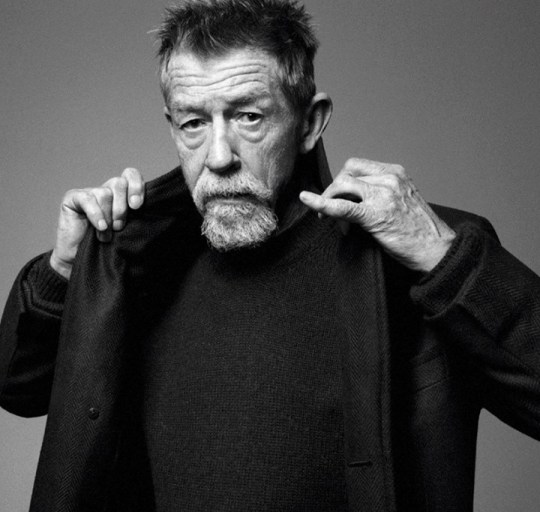
John Hurt nous a quitté...., vu sur Akihabara no Sasayaki http://ift.tt/2jLxXD9 John Hurt nous a quitté....Il restera pour moi le plus grand des Doctor.... # Bloc TechniqueNom de Naissance : John Vincent HurtDate de naissance : 22 janvier 1940Lieu de naissance : Chesterfield (Angleterre, Royaume-Uni)Date de décès: 25 janvier 2017 (à 77 ans)Lieu de décès: Cromer (Angleterre, Royaume-Uni)Profession : Acteur # Biographie (d'après wikipedia) John Hurt est le fils du vicaire anglican Arnold Herbert Hurt et de Phyllis Massey, ingénieur et comédienne amateur. Cantonné au début de sa carrière aux seconds rôles (Max dans Midnight Express ou G.W. Kane dans Alien, le huitième passager), il accède à la célébrité en incarnant John Merrick dans le film Elephant Man, qui lui vaut une nomination à l'Oscar du meilleur acteur en 1981 et le BAFTA Award du meilleur acteur dans un rôle principal, et à la télévision celui de Caligula dans la série Moi Claude empereur. Il a été également le conteur d'histoire dans la série Monstres et Merveilles qui est adaptée de légendes celtiques, russes ou encore allemande, en 1987. Il incarne notamment Billy Irvine dans La Porte du paradis (Heaven's Gate), Winston Smith dans 1984, le dictateur Adam Sutler dans V pour Vendetta et Monsieur Ollivander dans Harry Potter à l'École des Sorciers, rôle qu'il reprendra en 2010 dans Harry Potter et les Reliques de la Mort. En 2013, pour les 50 ans de la célèbre série télévisée britannique de science-fiction, Doctor Who, John Hurt joue une incarnation du Docteur surnommé The War Doctor (le « Docteur de la Guerre »). John Hurt a été anobli par la reine d'Angleterre en fin d'année 2014. Il annonce, le 16 juin 2015, qu'il est atteint d'un cancer du pancréas. Il meurt le 25 janvier 2017 à l'âge de 77 ans à Cromer . # Filmographie (d'après wikipedia) Cinéma 1962 : The Wild and the Willing de Ralph Thomas : Phil Corbett 1964 : This Is My Street de Sidney Hayers : Charlie 1966 : Un homme pour l'éternité (A Man for All Seasons) de Fred Zinnemann : Rich 1967 : Le Marin de Gibraltar (The Sailor from Gibraltar) de Tony Richardson : John 1969 : Davey des grands chemins (Sinful Davey) de John Huston : Davey Haggart 1969 : Avant que vienne l'hiver (Before Winter Comes) de J. Lee Thompson : le lieutenant Pilkington 1969 : À la recherche de Grégory, de Peter Wood : Daniel 1971 : Mr. Forbush and the Penguins (en) de Arne Sucksdorff, Alfred Viola et Roy Boulting : Richard Forbush 1971 : L'Étrangleur de la place Rillington (10 Rillington Place) de Richard Fleischer : Timothy John Evans 1972 : Le Joueur de flûte (The Pied Piper) de Jacques Demy : Franz 1974 : Little Malcolm de Stuart Cooper : Malcolm Scrawdyke 1975 : The Ghoul de Freddie Francis : Tom Rawlings 1976 : La linea del fiume de Aldo Scavarda : Chandler 1977 : Three Dangerous Ladies, segment The Island de Robert Fuest : le lieutenant Simmonds 1977 : East of Elephant Rock de Don Boyd : Nash 1977 : The Disappearance de Stuart Cooper : Atkinson 1978 : Le Cri du sorcier (The Shout) de Jerzy Skolimowski : Anthony Fielding 1978 : Midnight Express de Alan Parker : Max. 1978 : La Folle Escapade (Watership Down) de Martin Rosen : Hazel (voix). 1978 : Le Seigneur des anneaux (J. R. R. Tolkien's The Lord of the Rings) de Ralph Bakshi : Aragorn (voix) 1979 : Alien, le huitième passager (Alien) de Ridley Scott : Kane 1980 : Elephant Man de David Lynch : John Merrick 1980 : La Porte du paradis (Heaven's Gate) de Michael Cimino : Billy Irvine 1981 : La Folle Histoire du monde (History of the World: Part I) de Mel Brooks : Jésus-Christ 1982 : La Nuit de l'évasion (Night Crossing) de Delbert Mann : Peter Strelzyk 1982 : Partners de James Burrows : Kerwin 1982 : The Plague Dogs de Martin Rosen : Snitter (voix) 1983 : Osterman week-end (The Osterman Weekend) de Sam Peckinpah : Lawrence Fassett 1984 : Champions de John Irvin : Bob Irvin 1984 : Le Succès à tout prix (Success Is the Best Revenge) de Jerzy Skolimowski : Dino Montecurva 1984 : The Hit : Le tueur était presque parfait (The Hit) de Stephen Frears : Braddock 1984 : 1984 de Michael Radford : Winston Smith 1985 : After Darkness de Sergio Guerraz et Dominique Othenin-Girard : Peter Hunningford 1985 : Taram et le Chaudron magique (The Black Cauldron) de Ted Berman et Richard Rich : le Seigneur des Ténèbres (voix) 1986 : Jake Speed d'Andrew Lane : Sid 1987 : Rocinante d'Ann Guedes et Eduardo Guedes : Bill 1987 : The Hunting of the Snark de Mike Batt : Narrateur 1987 : Sur la route de Nairobi (White Mischief) de Michael Radford : Gilbert Colvile 1987 : From the Hip de Bob Clark : Douglas Benoit 1987 : Un sketch (Aria), segment I pagliacci de Bill Bryden : l'acteur 1987 : La Folle Histoire de l'espace (Spaceballs) de Mel Brooks : le lieutenant Kane de Alien 1988 : La Nuit bengali de Nicolas Klotz : Lucien Metz 1989 : Little Sweetheart de Anthony Simmons : Robert Burger 1989 : Scandal de Michael Caton-Jones : Stephen Ward 1990 : Romeo.Juliet de Armondo Linus Acosta : Mercutio 1990 : Windprints de David Wicht : Charles Rutherford 1990 : The Field de Jim Sheridan : The « Bird » O'Donnell 1990 : La Résurrection de Frankenstein (Frankenstein Unbound) de Roger Corman : Dr Joe Buchanan / Narrateur 1991 : I Dreamt I Woke Up de John Boorman : l’alter ego de Boorman Alter Ego 1991 : King Ralph de David S. Ward : lord Percival Graves 1992 : Lapse of Memory de Patrick Dewolf : Conrad Farmer 1992 : L'Œil qui ment de Raoul Ruiz : Anthony / le Marquis 1993 : Kölcsönkapott idö de István Poór : Sean 1993 : Monolithe de John Eyres : Villano 1993 : Even Cowgirls Get the Blues de Gus Van Sant : la comtesse 1994 : Poucelina (Thumbelina)) de Don Bluth : Mr Mole (voix) 1994 : Second Best de Chris Menges : oncle Turpin 1994 : Rabbit Ears: Aladdin and the Magic Lamp (vidéo) : le conteur 1995 : Two Nudes Bathing de John Boorman : marquis de Prey 1995 : Saigon Baby de David Attwood : Jack Lee 1995 : Rob Roy de Michael Caton-Jones : Montrose 1995 : Dead Man de Jim Jarmusch : John Scholfield 1995 : Wild Bill de Walter Hill : Charley Prince 1997 : Amour et mort à Long Island (Love and Death on Long Island) de Richard Kwietniowski : Giles De'Ath 1997 : Contact de Robert Zemeckis : S.R. Hadden 1997 : Brute, de Maciej Dejczer : Babits 1997 : Tender Loving Care (vidéo) : Dr Turner 1998 : The Commissioner de George Sluizer : James Morton 1998 : The Climb de Bob Swaim : Chuck Langer 1998 : Night Train de John Lynch : Michael Poole 1998 : All the Little Animals de Jeremy Thomas : Mr. Summers 1999 : New Blood de Michael Hurst : Alan White 1999 : Le Château des singes de Jean-François Laguionie : Sebastian (voix) 1999 : If... Dog... Rabbit... de Matthew Modine : Sean Cooper 1999 : You're Dead... de Andy Hurst : Maitland 2000 : Les Aventures de Tigrou (The Tigger Movie) de Jun Falkenstein : Narrateur (voix) 2000 : Les Âmes perdues (Lost Souls) de Janusz Kamiński : Père Lareaux 2001 : Tabloid de David Blair : Vince 2001 : Capitaine Corelli (Captain Corelli's Mandolin) de John Madden : Dr Iannis 2001 : Harry Potter à l'école des sorciers (Harry Potter and the Philosopher's Stone) de Chris Columbus : Mr. Ollivander 2002 : Miranda de Marc Munden : Christian 2002 : Crime and Punishment de Menahem Golan : Porfiry, l'enquêteur en chef 2003 : Mister Cash de Richard Kwietniowski : Victor Foss 2003 : Meeting Che Guevara and the Man from Maybury Hill, court-métrage de Anthony Byrne : l'homme de Maybury Hill 2003 : Dogville de Lars von Trier : Narrateur 2004 : Hellboy de Guillermo del Toro : Professeur Trevor « Broom » Bruttenholm 2005 : Short Order de Anthony Byrne : Felix 2005 : Vaillant, pigeon de combat ! (Valiant) de Gary Chapman : Felix (voix) 2005 : The Proposition de John Hillcoat : Jellon Lamb 2005 : Shooting Dogs de Michael Caton-Jones : Christopher 2005 : Manderlay de Lars von Trier : Narrateur (voix) 2005 : La Porte des secrets (The Skeleton Key) de Iain Softley : Ben Devereaux 2006 : V pour Vendetta (V for Vendetta) de James McTeigue : Adam Sutler 2006 : Le Parfum, histoire d'un meurtrier (Perfume: The Story of a Murderer) de Tom Tykwer : Narrateur 2007 : Boxes de Jane Birkin : le père de Fanny 2008 : Crimes à Oxford (The Oxford Murders) de Álex de la Iglesia : Arthur Seldom 2008 : Indiana Jones et le Royaume du crâne de cristal (Indiana Jones and the Kingdom of the Crystal Skull) de Steven Spielberg : professeur « Ox » Oxley 2008 : Outlander : Le Dernier Viking (Outlander) de Howard McCain : Rothgar 2008 : Hellboy 2 : Les Légions d'or maudites (Hellboy II: The Golden Army) de Guillermo del Toro : professeur Trevor « Broom » Bruttenholm 2008 : Lezione 21 d'Alessandro Baricco : Mondrian Kilroy 2009 : New York, I Love You : Bellhop 2009 : An Englishman in New York de Richard Laxton : Quentin Crisp 2009 : The Limits of Control de Jim Jarmusch : Guitar 2009 : 44 Inch Chest de Malcom Venville : le vieil homme aux cacahuètes 2010 : Lou de Belinda Chayko : Doyle 2010 : Brighton Rock de Rowan Joffé : Phil Corkery 2010 : Harry Potter et les Reliques de la Mort, partie 1 (Harry Potter and the Deathly Hallows: Part 1) de David Yates : Mr. Ollivander 2010 : Love at First Sight de Michael Davies : Arthur 2010 : Ultramarines (Ultramarines: A Warhammer 40,000 Movie) de Martyn Pick : Carnak 2011 : Regret Not Speaking de Richard Kwietniowski 2011 : Melancholia de Lars von Trier : Dexter 2011 : Harry Potter et les Reliques de la Mort, partie 2 (Harry Potter and the Deathly Hallows: Part 2) de David Yates : Mr. Ollivander 2011 : Les Immortels de Tarsem Singh : Zeus vieux 2012 : La Taupe (Tinker, Tailor, Soldier, Spy) de Tomas Alfredson 2012 : Jayne Mansfield's Car de Billy Bob Thornton 2013 : Le Transperceneige (설국열차) de Bong Joon-ho : Gilliam 2013 : Only Lovers Left Alive de Jim Jarmusch : Marlowe 2014 : Hercule (Hercules) de Brett Ratner : Cotys 2016 : Jackie de Pablo Larraín : le père Richard McSorley 2016 : The Journey de Nick Hamm : Harry Patterson 2016 : ChickList de Tony Britten : Francis Bonar 2016 : The Good Night d'Eric Styles : Ralph 2016 : Damascus Cover de Daniel Zelik Berk : Miki 2017 : My name is Lenny de Ron Scalpello : Leslie Salmon 2017 : Darkest Hour de Joe Wright : Neville Chamberlain 2017 : Back To Utopia de Fabio Wuytack: Peter Panludic (voice over)Séries 1961-1962 : Probation Officer : Johnny Seton / Norman Bailey 1961-1963 : Drama 61-67 : Private Briggs / Tom 1962 : Z Cars : James Hogan 1963 : Once Aboard the Lugger : Jobey Todd 1963-1964 : First Night : Desmond / Garry 1964-1965 : ITV Play of the Week : Dave / Terry 1964 : Armchair Theatre 1964 : Love Story : Harry Eddows 1964 : Gideon's Way : Freddy Tinsdale 1964 : Thursday Theatre : Orpheus 1967 : ITV Playhouse : Guy 1971 : ITV Saturday Night Theatre : Bob 1973 : Wessex Tales : Joshua Harlborough 1976 : Shades of Greene : Fred 1976 : Play for Today : Alec Cassell 1976 : Regan : Tony Grey 1976 : Moi Claude empereur (I, Claudius) : Caligula 1979 : Crime et Châtiment : Raskolnikov 1988 : Monstres et Merveilles : narrateur 1991 : Red Fox : Archie Carpenter 1991 : Screenplay : Alfred 1994 : Picture Windows : Comte 1999-2000 : Watership Down : le général Woundwort 2004-2006 : The Alan Clark Diaries : Alan Clark 2008-2012 : Merlin : le Grand Dragon, voix originale du Dragon, et la phrase d'introduction au début de chaque épisode 2011 : The Confession, web-série : le prêtre 2012 : Labyrinthe : Audric Baillard 2013 : Doctor Who : The War Doctor 2015 : Panthers de Johan Renck : Tom # Distinctions (d'après wikipedia) Récompenses Golden Globes 1979 : Meilleur acteur dans un second rôle dans un drame biographique pour Midnight Express (1978). BAFTA 1979 : Meilleur acteur dans un second rôle dans un drame biographique pour Midnight Express (1978). Festival international du film de femmes de Salé 2011 : Prix d'interprétation masculine dans un drame pour Lou (2010). Evening Standard British Film Awards 2012 : Alexander Walker Special AwardNominations 1972 : BAFTA Awards du meilleur acteur dans un second rôle dans un drame biographique pour L'Étrangleur de la place Rillington (1971). 1979 : Oscar du meilleur acteur dans un second rôle pour Midnight Express (1978). 1980 : BAFTA Awards du meilleur acteur dans un second rôle dans un film de science-fiction pour Alien, le huitième passager (1979). 1981 : Golden Globes du meilleur acteur dans un drame pour Elephant Man (1980). 1981 : Oscar du meilleur acteur pour Elephant Man (1980). 1991 : BAFTA Awards du meilleur acteur dans un second rôle dans un drame pour The Field (1990). 1998 : Boston Society of Film Critics Awards du meilleur acteur dans une comédie dramatique pour Amour et mort à Long Island (1997). 1998 : Online Film & Television Association du meilleur acteur dans une comédie dramatique pour Amour et mort à Long Island (1997). 1999 : British Independent Film Awards du meilleur acteur dans une comédie dramatique pour Amour et mort à Long Island (1997). 2005 : Fangoria Chainsaw Awards du meilleur acteur dans un second rôle dans un film fantastique pour Hellboy (2004). 2005 : Australian Film Institute du meilleur acteur dans un second rôle dans un drame pour The Proposition (2005). 2010 : London Critics Circle Film Awards du meilleur acteur de l'année dans un second rôle dans un drame pour 44 Inch Chest (2009). 2010 : San Diego Film Critics Society Awards du meilleur acteur dans un second rôle dans un drame pour 44 Inch Chest (2009). 2010 : BAFTA Awards du meilleur acteur dans un second rôle dans un drame pour An Englishman in New York (2009). 2012 : Bodil Awards du meilleur acteur dans un second rôle dans un drame pour Melancholia (2011). Tags : #personnalité #John-Hurt #Acteur #Hercule #Alie #Elephant-Man #1984 #Harry-Potter #V-pour-Vendetta #Indiana-Jones #Doctor-Who http://ift.tt/2kD0QCp
1 note
·
View note